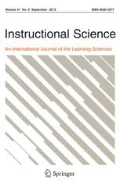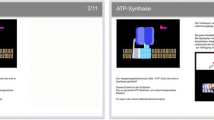Abstract
Using cognitive load theory and cognitivetheory of multimedia learning as a framework,we conducted two within-subject experimentswith 10 participants each in order toinvestigate (1) if the audiovisual presentationof verbal and pictorial learning materialswould lead to a higher demand on phonologicalcognitive capacities than the visual-onlypresentation of the same material, and (2) ifadding seductive background music to anaudiovisual information presentation wouldincrease the phonological cognitive load. Weemployed the dual-task methodology in order toachieve a direct measurement of cognitive loadin the phonological system. In bothexperiments, the modality effect could beconfirmed in the patterns of secondary taskperformance and in the primary learning task.
Similar content being viewed by others
REFERENCES
Anderson, J.R. (1983) The Architecture of Cognition. Cambridge, MA: Harvard University Press.
Asymetrix (1997) Toolbook Instructor II [Computer Program, PC]. Bellevue, WA: Asymetrix Learning Systems.
Baddeley, A.D. (1986) Working Memory. Oxford: Oxford University Press.
Baddeley, A.D. & Logie, R.H. (1999) Working memory: The multiple-component model. In: A. Miyake & P. Shah (eds), Models of Working Memory. Mechanisms of Active Maintenance and Executive Control, pp. 28–61. Cambridge: Cambridge University Press.
Brünken, R. & Leutner, D. (2001) Aufmerksamkeitsverteilung oder Aufmerksamkeitsfokussierung? Empirische Ergebnisse zur “Split-Attention-Hypothese” beim Lernen mit Multimedia. [Split of attention or focusing of attention? Empirical results on the splitattention-hypothesis in multimedia learning], Unterrichtswissenschaft 29: 357–366.
Brünken, R., Plass, J.L. & Leutner, D. (2003) Direct measurement of cognitive load in multimedia learning, Educational Psychologist 38(1): 53–62.
Brünken, R., Steinbacher, S., Plass, J.L. & Leutner, D. (2002) Assessment of cognitive load in multimedia learning using dual-task methodology, Experimental Psychology 49: 1–12.
Brünken, R., Steinbacher, S., Schnotz, W. & Leutner, D. (2001) Mentale Modelle und Effekte der Präsentations-und Abrufkodalität beim Lernen mit Multimedia. [Mental models and the effect of presentation and retrieval codality in multimedia learning], Zeitschrift für Pädagogische Psychologie 15: 15–27.
Chandler, P. & Sweller, J. (1991) Cognitive Load Theory and the format of instruction, Cognition and Instruction 8: 293–332.
Klauer, K.J. (1987) DeKriteriumsorientierte Tests [Criterion Referenced Tests]. Göttingen: Hogrefe.
Mayer, R.E. (2001) Multimedia Learning. New York: Cambridge University Press.
Mayer, R.E. & Moreno, R. (1998) A split attention effect in multimedia learning: Evidence for dual processing systems in working memory, Journal of Educational Psychology 90: 312–320.
Moreno, R. & Mayer, R.E. (2000) A coherence effect in multimedia learning: The case for minimizing irrelevant sounds in the design of multimedia instructional messages, Journal of Educational Psychology 92: 117–125.
Mousavi, S.Y., Low, R. & Sweller, J. (1995) Reducing cognitive load by mixing auditory and visual presentation modes, Journal of Educational Psychology 87: 319–334.
Miyake, A. & Shah, P. (eds) (1999) Models of Working Memory. Mechanisms of Active Maintenance and Executive Control. Cambridge: Cambridge University Press.
Paas, F., Renkl, A. & Sweller, J. (2003) Cognitive Load Theory and instructional design: Recent developments, Educational Psychologist 38(1): 1–4.
Paas, F., Tuovinen, J., Tabbers, H. & van Gerven, P. (2003) Mental workload measurement as a means to advance Cognitive Load Theory, Educational Psychologist 38(1): 63–71.
Paivio, A. (1986) Mental Representations: A Dual Coding Approach. New York: Oxford University Press.
Plass, J.L., Chun, D.M., Mayer, R.E. & Leutner, D. (2003) Cognitive load in reading a foreign language text with multimedia aids and the influence of verbal and spatial abilities, Computers in Human Behavior 19: 221–243.
Plass, J.L., Chun, D.M., Mayer, R.E. & Leutner, D. (1998) Supporting visual and verbal learning preferences in a second language multimedia learning environment, Journal of Educational Psychology 90: 25–36.
Schnotz, W. (2001) Wissenserwerb mitMultimedia [Knowledge acquisition with multimedia], Unterrichtswissenschaft 29: 292–318.
Sweller, J. (1999) Instructional Design in Technical Areas. Camberwell, Australia: ACER Press.
Sweller, J., Van Merriënboer, J. & Paas, F. (1998) Cognitive architecture and instructional design, Educational Psychology Review 10: 251–296.
Tabbers, H.K. (2002) The Modality of Text in Multimedia Instructions. Unpublished Doctoral Dissertation, Open University of the Netherlands, Heerlen, NL.
Tindall-Ford, S., Chandler, P. & Sweller, J. (1997) When two sensory modes are better than one, Journal of Experimental Psychology: Applied 3: 257–287.
Valcke, M. (2002) Cognitive load: Updating the theory? Learning and Instruction 12: 147–154.
Wittrock, M.C. (1990) Generative processes of comprehension, Educational Psychologist 24: 345–376.
Author information
Authors and Affiliations
Corresponding author
Rights and permissions
About this article
Cite this article
Brünken, R., Plass, J.L. & Leutner, D. Assessment of Cognitive Load in Multimedia Learning with Dual-Task Methodology: Auditory Load and Modality Effects. Instructional Science 32, 115–132 (2004). https://doi.org/10.1023/B:TRUC.0000021812.96911.c5
Issue Date:
DOI: https://doi.org/10.1023/B:TRUC.0000021812.96911.c5




